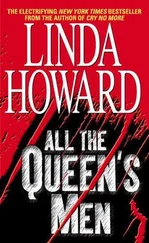Роберт Уоррен - All the king's men
Здесь есть возможность читать онлайн «Роберт Уоррен - All the king's men» весь текст электронной книги совершенно бесплатно (целиком полную версию без сокращений). В некоторых случаях можно слушать аудио, скачать через торрент в формате fb2 и присутствует краткое содержание. Жанр: Современная проза, на английском языке. Описание произведения, (предисловие) а так же отзывы посетителей доступны на портале библиотеки ЛибКат.
- Название:All the king's men
- Автор:
- Жанр:
- Год:неизвестен
- ISBN:нет данных
- Рейтинг книги:4 / 5. Голосов: 1
-
Избранное:Добавить в избранное
- Отзывы:
-
Ваша оценка:
- 80
- 1
- 2
- 3
- 4
- 5
All the king's men: краткое содержание, описание и аннотация
Предлагаем к чтению аннотацию, описание, краткое содержание или предисловие (зависит от того, что написал сам автор книги «All the king's men»). Если вы не нашли необходимую информацию о книге — напишите в комментариях, мы постараемся отыскать её.
All the king's men — читать онлайн бесплатно полную книгу (весь текст) целиком
Ниже представлен текст книги, разбитый по страницам. Система сохранения места последней прочитанной страницы, позволяет с удобством читать онлайн бесплатно книгу «All the king's men», без необходимости каждый раз заново искать на чём Вы остановились. Поставьте закладку, и сможете в любой момент перейти на страницу, на которой закончили чтение.
Интервал:
Закладка:
"Maybe you spoil him," I said.
He put the spoon back into the bowl, which was on the floor beside him, then began to fumble in his pockets. He fished out, finally, a bar of chocolate, somewhat wilted form the heat, and began to peel back the sticky tinfoil. The last tears were running down George's cheeks, while he watched the process, with his mouth open in damp and happy expectation. But he did not grab with his chubby little mitts.
Then the old man broke off a piece of chocolate and placed it between the expectant lips, and peered into George's face while taste buds, no doubt, glowed incandescent in the inner dark and gland with a tired, sweet, happy sigh released their juices, and George's face took on an expression of slow, deep, inward, germinal bliss, like that of a saint.
_Well__, I almost said to the old man, _you said the physical was never cause, but a chocolate bar is physical and look what it's causing, for to look at that face you might think it was a bite of Jesus and not a slug of Hershey's had done. And how you going to tell the difference, huh?__
But I didn't say it, for I was looking there at the old man, who was leaning over with his spectacles hanging and his coat hanging and his belly hanging from the leaning, and who was holding out another morsel of chocolate and who was clucking soft, and whose own face was happy, for that was the word for what his face was, and as I looked at him I suddenly saw the man in the long white room by the sea, the same man but a different man, and the rain of the squall driving in off the sea in the early dark lashed the windowpanes but it was a happy sound and safe because the fire danced on the hearth and on the windowpanes where the rain ran down to thread the night-black glass with silver, to mix the silver with the flames caught there, too, and the man leaned and held out something and said, "Here's what Daddy brought tonight, but just one bite now–" and the man broke off a piece and held it out–"just one bite, for your supper's near ready now–but after supper–"
I looked at the old man over there and my guts went warm and a big lump seemed to dissolve in my chest–as though I had carried a big lump around in there for so long I had got used to it and didn't realized it had been there until suddenly it was gone and the breath came easy. "Father," I said, "Father–"
The old man looked up at me and said querulously, "What–what did you say?"
_Oh, father, father!__ but he wasn't in the long white room by the sea any more and never would be, for he had walked out of it–why? why? because he wasn't enough of a man to run his own house, because he was a fool, because–and he had walked a long way and up the steps to this room where an old man leaned with the chocolate in his hand and happiness–if that was what it was–momentarily on his face. Only it wasn't on his face now. There was just the faint peevishness of an old person who hasn't quite understood the faint peevishness of an old person who hasn't quite understood something said.
But I had come a long way, too, from that long white room by the sea, I had got up off that hearthrug before the fire, where I had sat with my tin circus wagon and my colored crayons and paper, listening to the squall-driven rain on the glass, and where Daddy had leaned to say, "Here's what Daddy brought tonight," and I had come to this room where Jack Burden leaned against the wall with a cigarette in his mouth. Nobody was leaning over him to give him chocolate.
So, looking into the old man's face, answering his querulous question, I said, "Oh, nothing." For that was what it was. Whatever it had been was nothing now. For whatever was is not now, and whatever is will not be, and the foam that looks so sun-bright when the wind is kicking up the breakers lies streaked on the hard sand after the tide is out and looks like scum off the dishwater.
But there was something: scum left on the hard sand. So I said, "Yeah, there was something."
"What?"
"Tell me about Judge Irwin," I said.
He straightened up to face me, blinking palely behind the spectacles as he had blinked at me upon coming from light into the darkness of the Mexican restaurant below.
"Judge Irwin," I repeated, "you know–your old bosom pal."
"That was another time," he croaked, staring at me, holding the broken chocolate in his hand.
"Sure, it was," I said, and looking at him now, thought, _It sure-God was__. And said, "Sure, but you remember."
"That time is dead," he said.
"Yeah, but you aren't."
"The sinful man I was who reached for vanity and corruption is dead. If I sin now it is in weakness and not in will. I have put away foulness."
"Listen," I said, "it's just a simple question. Just one question."
"I have put it away, that time," he said, and made a pushing gesture with his hands.
"Just one question," I insisted.
He looked at me without speaking.
"Listen," I said, "was Irwin ever broke, did he ever really need money? Bad?
He stared at me from a long way off, across the distance, beyond the bowl of soup on the floor, over the chocolate in his hand, through time. Then he demanded, "Why–why do you want to know?"
"To tell the truth," I burst out without meaning to, "I don't. But somebody does, and that somebody pays me the first of the month. It is Governor Stark."
"Foulness," he said, staring across whatever it was between us, "foulness."
"Was Irwin ever broke?" I said.
"Foulness," he affirmed.
"Listen," I said, "I don't reckon Governor Stark–if that is what all this foulness stuff is about–takes it to the Lord in prayer, but did you ever stop to think what a mess your fine, God-damned, plug-hatted, church-going, Horace-quoting friends like Stanton and Irwin left this state in? At least the Boss does something, but they–they sat on their asses–they–"
"All foulness!" the old man uttered, and swept his right arm wildly before him, the hand clutching the chocolate hard enough to squash it. A part of the chocolate fell to the floor. Baby got it.
"If you meant to imply," I said, "that politics, including that of erstwhile pals, I not exactly like Easter Week in a nunnery, you are right. But I will beat you to the metaphysical draw this time. Politics is action and all action is but a flaw in the perfection on nonbeing. Which is God. For if God is perfection and the only perfection is in nonbeing, then God is nonbeing. Then God is nothing. Nothing can give no basis for the criticism of Thing in its thingness. Then where do you get anything to say? Then where do you get off?"
"Foolishness, foolishness," he said, "foolishness and foulness!"
"I guess you are right," I said. "It is foolishness. But it is no more foolish than all that kind of talk. Always words."
"You speak foulness."
"No, just words," I said, "and all words are alike."
"God is not mocked," he said, and I saw that his head was quivering on his neck.
I stepped quickly toward him, stopping just in front of him. "Was Irwin ever broke?" I demanded.
He seemed about to say something, his lips opening. Then they closed.
"Was he?" I demanded.
"I will not touch the world of foulness again," he said, his pale eyes looking steadily upward into my face, "that my hand shall come away with the stink on my fingers."
I felt like grabbing him and shaking him until his teeth rattled. I felt like shaking it out of him. But you can't grab an old man and do that. I had gone at the thing wrong. I ought to have led up to it and tried to trick him. I ought to have wheedled him. But I always got so keyed up and on edge when I got around him that I couldn't think of anything but getting away from him. And then when I had left I always felt worse until I got him out of my mind. I had muffed it.
That was all I got. As I was going out, I looked back to see Baby, who had finished the piece of chocolate dropped by the old man, meditatively moving his hand about on the floor to locate any stray crumbs. Then the old man leaned slowly and heavily toward him, again.
Читать дальшеИнтервал:
Закладка:
Похожие книги на «All the king's men»
Представляем Вашему вниманию похожие книги на «All the king's men» списком для выбора. Мы отобрали схожую по названию и смыслу литературу в надежде предоставить читателям больше вариантов отыскать новые, интересные, ещё непрочитанные произведения.
Обсуждение, отзывы о книге «All the king's men» и просто собственные мнения читателей. Оставьте ваши комментарии, напишите, что Вы думаете о произведении, его смысле или главных героях. Укажите что конкретно понравилось, а что нет, и почему Вы так считаете.





![Роберт Уоррен - Рассказы [Компиляция]](/books/419993/robert-uorren-rasskazy-kompilyaciya-thumb.webp)


